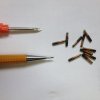The University of British Columbia is tagging and tracking adult Chinook and Coho salmon examining the effects of catch and release on salmon behavior and survival. They are being tracked from underwater acoustic telemetry receivers situated throughout coastal BC. The external transmitters are easily identifiable and resemble a small double A battery, and are tied onto the back of the fish behind the dorsal fin using a plastic cord. (see photo below).
If you catch one of these fish, can you record the tag number found on the transmitter and release the fish. The phone number is on the plastic cord to report the catch and release. If you keep the fish, can you call the phone number (604 822-1969) and provide your contact information, date/location of capture. We can re-use the tag if its returned.
A total of 180 tags were deployed onto Chinook in the Discovery Island region in early June 2020. The plan is to apply a further 200 tags onto Chinook and Coho near Port Renfrew in mid-August to mid-September.
There are also other research initiatives underway that focus on marine survival of juvenile Chinook and Coho using PIT tags. They are the size of a large grain of rice and can be found in the body cavity while cleaning your catch (see second photo). If you come across a PIT tag please retain it in a bag or safe place and PM me so it can be read with an RFID scanner. The tags contain a unique ID that can be traced back to a specific fish and assist our understanding of which fish are surviving to contribute to fisheries as well as adult returns. This work has been ongoing since 2014 and is scheduled to ramp up significantly starting in fall 2020.
Feel free to contact me for more information or if you have any tag recoveries you wish to track down.
Kevin


If you catch one of these fish, can you record the tag number found on the transmitter and release the fish. The phone number is on the plastic cord to report the catch and release. If you keep the fish, can you call the phone number (604 822-1969) and provide your contact information, date/location of capture. We can re-use the tag if its returned.
A total of 180 tags were deployed onto Chinook in the Discovery Island region in early June 2020. The plan is to apply a further 200 tags onto Chinook and Coho near Port Renfrew in mid-August to mid-September.
There are also other research initiatives underway that focus on marine survival of juvenile Chinook and Coho using PIT tags. They are the size of a large grain of rice and can be found in the body cavity while cleaning your catch (see second photo). If you come across a PIT tag please retain it in a bag or safe place and PM me so it can be read with an RFID scanner. The tags contain a unique ID that can be traced back to a specific fish and assist our understanding of which fish are surviving to contribute to fisheries as well as adult returns. This work has been ongoing since 2014 and is scheduled to ramp up significantly starting in fall 2020.
Feel free to contact me for more information or if you have any tag recoveries you wish to track down.
Kevin


